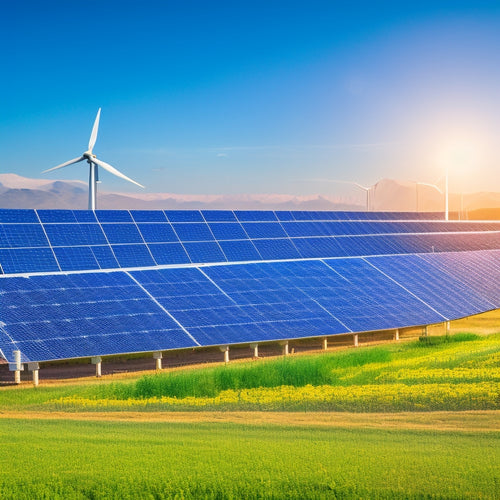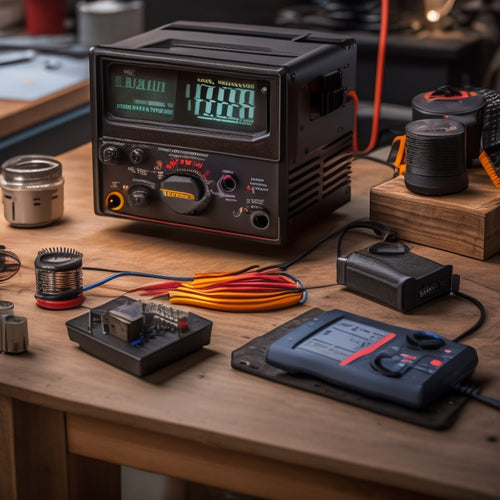
Powering Remote Homes With Renewable Energy Systems
Share
You're looking to power your remote home with renewable energy systems, which can bring you energy independence, significant cost savings, and a reduced environmental impact. To get started, you'll need to evaluate solar power backup systems that include energy storage solutions like batteries, accurately calculate your daily energy usage, and choose the right solar panels for your roof. You'll also need to set up an inverter and charge controller to regulate energy flow. As you investigate these components, you'll uncover the ins and outs of off-grid energy systems and reveal the benefits and challenges that come with them - and that's just the beginning of your expedition towards a sustainable energy solution.
Key Takeaways
- Accurate calculation of daily energy usage is crucial for determining the required battery size in a solar power system for remote homes.
- Choosing the right solar panels depends on factors such as efficiency, durability, and compatibility with the energy storage system and installation conditions.
- Energy storage systems, like deep cycle batteries, are essential for providing a steady power supply during periods of low sunlight or wind.
- Inverters and charge controllers play critical roles in converting DC power to AC power and regulating energy flow between solar panels, batteries, and appliances.
- Regular maintenance, including cleaning solar panels and monitoring performance, is necessary to ensure peak efficiency and longevity of the renewable energy system.
Understanding Solar Power Backup
You're considering solar power as a primary energy source for your remote home, but you're aware that the sun doesn't always shine.
Solar panel efficiency varies depending on factors like weather conditions, panel quality, and installation. To guarantee a reliable energy supply, you'll need backup power solutions. This can include energy storage systems like batteries, which store excess energy generated by your solar panels during the day for use during periods of low sunlight or at night.
Accurate daily energy usage calculation is vital to determine the right battery size for your needs, and selecting the right battery type, such as lithium-ion, is essential for deep cycling capabilities.
Additionally, you may consider a backup generator or grid connection to supplement your energy needs during extended periods of low solar radiation.
Benefits of Off-Grid Energy Systems
Living off-grid can be incredibly liberating, as it allows you to break free from reliance on public utilities and gain energy independence.
With an off-grid energy system, you'll experience significant cost savings by avoiding monthly utility bills. Additionally, you'll reduce your environmental impact by utilizing renewable energy sources, such as solar power solutions that offer reliable and efficient energy generation.
These systems are highly scalable, making them suitable for remote homes of various sizes, and can be integrated with other renewable energy sources like wind energy for enhanced reliability and efficiency.
While installation can present challenges, advancements in technology have improved energy efficiency and made these systems more reliable.
Moreover, off-grid energy systems provide remote accessibility, ensuring you have power even in areas with limited grid connectivity.
Choosing the Right Solar Panels
Choosing the Right Solar Panels
Three essential factors to evaluate when selecting solar panels for your off-grid energy system are efficiency, durability, and compatibility. You'll want to take into account the type of solar panel that best suits your needs, considering the available space, climate, and energy requirements.
| Solar Panel Type | Characteristics |
|---|---|
| Monocrystalline | High efficiency, durable, and expensive |
| Polycrystalline | Mid-range efficiency, affordable, and durable |
| Thin-Film | Low efficiency, cheap, and flexible |
When making your selection, contemplate installation considerations such as roof size, orientation, and shading. Verify the chosen solar panels are compatible with your energy system's components, including the inverter and charge controller. By evaluating these factors, you'll be able to choose the right solar panels for your off-grid energy system.
Energy Storage for Remote Homes
As you plan your off-grid energy system, energy storage becomes a critical component to guarantee a steady power supply when the sun isn't shining or during periods of high energy demand.
Evaluating your off-grid energy needs calculating total power consumption is essential to determine the required energy storage capacity. You'll need to take into account various battery technologies, each with its own strengths and weaknesses.
Deep cycle batteries, for instance, are designed to provide a steady flow of energy over a long period, making them ideal for off-grid systems.
You'll also need to contemplate energy management, which involves regulating the flow of energy between your solar panels, batteries, and appliances. A well-designed energy management system guarantees that your batteries are charged efficiently and your appliances receive the power they need.
Inverter and Charge Controller Setup
You've carefully planned your energy storage system, now it's time to focus on the inverter and charge controller setup, which plays an essential role in converting and regulating the energy flow in your off-grid system. The inverter converts DC power from your energy storage system to AC power for your home's appliances, while the charge controller guarantees your batteries are charged safely and efficiently.
| Component | Function | Types/Options |
|---|---|---|
| Inverter | Converts DC to AC power | String, Micro, Power Optimizer |
| Charge Controller | Regulates battery charging | PWM, MPPT, Solar Charge Controller |
| Inverter-Charger | Combines inverter and charger functions | Grid-Tie, Off-Grid, Hybrid |
| Monitoring System | Tracks system performance | Remote monitoring, Data logging, Alarms |
Maintaining Your Solar Power System
You'll need to perform routine maintenance tasks to guarantee your solar power system operates at peak efficiency.
This includes cleaning the panels to remove dirt and debris, monitoring performance data to identify potential issues, and scheduling regular maintenance checks to catch any problems before they escalate.
Cleaning the Panels
Dust, dirt, and debris accumulation on your solar panels can considerably reduce their energy output, sometimes by as much as 25%. This is because dirt and grime block sunlight from reaching the photovoltaic cells, decreasing their ability to generate electricity.
You should clean your solar panels regularly to maintain their efficiency. The frequency of cleaning depends on the panel type and environmental factors. For instance, panels in dusty or polluted areas may require more frequent cleaning.
Some important things to reflect on when cleaning your solar panels:
- Use a soft-bristled brush or a specialized solar panel cleaning tool to avoid scratching the surface.
- Avoid using harsh chemicals or abrasive materials that can damage the panels.
- Clean the panels during the early morning or evening when the sun isn't intense.
- Use deionized water to prevent mineral buildup.
- Consider hiring a professional if you're not comfortable with heights or don't have the necessary equipment.
Monitoring Performance Data
Since your solar power system is a significant investment, monitoring its performance data is essential to confirm it operates at its best level.
You'll want to keep track of key performance metrics, such as energy output, voltage, and temperature, to guarantee your system is running efficiently.
Data analytics tools can help you analyze this data, identifying trends and potential issues.
By regularly reviewing your system's performance, you can quickly identify and address any problems, minimizing downtime and optimizing energy production.
This proactive approach will help you get the most out of your solar power system and confirm it continues to provide reliable, clean energy for your remote home.
Scheduled Maintenance Checks
How often do you inspect your solar power system to confirm it's functioning at its best? Regular scheduled maintenance checks are essential to guarantee your system operates efficiently and effectively.
Performing seasonal inspections can help identify potential issues before they become major problems. This preventive maintenance approach saves you time, money, and energy in the long run.
- Verify the system's grounding and bonding connections are secure and corrosion-free
- Inspect the panels for dirt, debris, or damage, and clean them as needed
- Check the inverter's performance and temperature
- Ascertain all electrical connections are tight and secure
- Review the system's monitoring data to detect any anomalies or trends
Frequently Asked Questions
Can I Use Renewable Energy Systems With Existing Grid Connections?
Think of your energy needs like a bucket: you can fill it with renewables, but what about excess? You can use grid-tied systems to sell back to the utility, and energy storage to bank it for later, making renewables a reliable choice for you.
How Do I Ensure Energy Independence With Renewable Systems?
To guarantee energy independence with renewable systems, you'll want to prioritize energy storage solutions, like batteries, to stabilize your power supply and perform regular system maintenance to optimize performance and troubleshoot potential issues.
Are Renewable Energy Systems Suitable for Extreme Weather Conditions?
You're likely aware that 2019's Hurricane Dorian brought winds of 185mph; remarkably, renewable energy systems can withstand such forces. When choosing a system, prioritize extreme weather performance and system durability to guarantee your investment remains operational despite harsh conditions.
Can I Add More Solar Panels to My Existing System Later?
You can expand your existing solar panel system, but first, you'll need to check the solar panel compatibility and system expansion options to guarantee seamless integration and ideal performance, avoiding potential technical and safety issues.
Do Renewable Energy Systems Require Special Permits or Licenses?
You think going green means bypassing bureaucracy, but surprise! You'll need to maneuver permit requirements and licensing regulations, ensuring your eco-friendly setup meets local standards, so don't assume a free pass, and research what's required in your area.
Related Posts
-

The Role of Battery Monitoring Systems in Renewable Energy
Battery monitoring systems play an essential role in renewable energy by enhancing system longevity and optimizing pe...
-

Top 10 Off Grid Camping Gear Must-Haves
When you're off-grid camping, the right gear is crucial for a smooth expedition. Start with a durable, weather-resist...
-

Key Features of a DC to AC Converter
A DC to AC converter features high efficiency and conversion rates, which reduce energy costs and improve performance...


